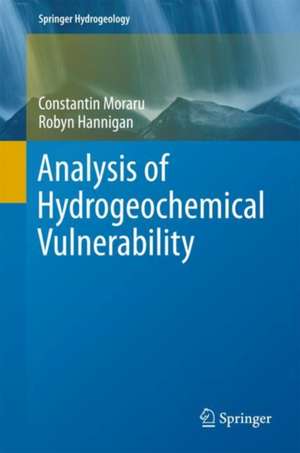Analysis of Hydrogeochemical Vulnerability: Springer Hydrogeology
Autor Constantin Moraru, Robyn Hanniganen Limba Engleză Hardback – 29 dec 2017
| Toate formatele și edițiile | Preț | Express |
|---|---|---|
| Paperback (1) | 356.31 lei 38-44 zile | |
| Springer International Publishing – 4 sep 2018 | 356.31 lei 38-44 zile | |
| Hardback (1) | 389.11 lei 6-8 săpt. | |
| Springer International Publishing – 29 dec 2017 | 389.11 lei 6-8 săpt. |
Din seria Springer Hydrogeology
- 15%
 Preț: 649.06 lei
Preț: 649.06 lei - 24%
 Preț: 795.36 lei
Preț: 795.36 lei - 24%
 Preț: 793.36 lei
Preț: 793.36 lei - 18%
 Preț: 963.91 lei
Preț: 963.91 lei - 15%
 Preț: 635.96 lei
Preț: 635.96 lei - 15%
 Preț: 637.59 lei
Preț: 637.59 lei - 15%
 Preț: 643.00 lei
Preț: 643.00 lei - 18%
 Preț: 1130.45 lei
Preț: 1130.45 lei - 18%
 Preț: 730.16 lei
Preț: 730.16 lei - 24%
 Preț: 874.52 lei
Preț: 874.52 lei - 15%
 Preț: 648.24 lei
Preț: 648.24 lei - 24%
 Preț: 1352.70 lei
Preț: 1352.70 lei - 24%
 Preț: 853.51 lei
Preț: 853.51 lei - 18%
 Preț: 900.80 lei
Preț: 900.80 lei - 18%
 Preț: 796.61 lei
Preț: 796.61 lei - 15%
 Preț: 587.39 lei
Preț: 587.39 lei - 15%
 Preț: 702.08 lei
Preț: 702.08 lei
Preț: 389.11 lei
Nou
Puncte Express: 584
Preț estimativ în valută:
74.45€ • 77.95$ • 61.61£
74.45€ • 77.95$ • 61.61£
Carte tipărită la comandă
Livrare economică 05-19 aprilie
Preluare comenzi: 021 569.72.76
Specificații
ISBN-13: 9783319709598
ISBN-10: 3319709593
Pagini: 215
Ilustrații: XVI, 171 p. 113 illus., 69 illus. in color.
Dimensiuni: 155 x 235 mm
Greutate: 0.44 kg
Ediția:1st ed. 2018
Editura: Springer International Publishing
Colecția Springer
Seria Springer Hydrogeology
Locul publicării:Cham, Switzerland
ISBN-10: 3319709593
Pagini: 215
Ilustrații: XVI, 171 p. 113 illus., 69 illus. in color.
Dimensiuni: 155 x 235 mm
Greutate: 0.44 kg
Ediția:1st ed. 2018
Editura: Springer International Publishing
Colecția Springer
Seria Springer Hydrogeology
Locul publicării:Cham, Switzerland
Cuprins
Overview of groundwater vulnerability assessment methods.- Geochemical method of the groundwater vulnerability assessment.- Basic principles of hydrogeology for hydrogeochemical vulnerability.- Environmental settings of study territories.- Hydrogeochemical vulnerability estimation.- Groundwater geochemistry and vulnerability.
Notă biografică
Robyn HANNIGAN, Professor, PhD, is the Dean of the School for the Environment at the University of Massachusetts Boston, USA. She is actively engaged at the national and international level in both environmental service and research. As a geochemist, Robyn's research focuses on studying groundwater, groundwater – surface water interrelation in geological and climatically dynamic environments, and surface climate change-ocean interactions through the chemistry of water. Water resources protection, including ground water, is constantly in her scientific focus. She has valuable professional publications and contributions in groundwater geochemistry. Dr. Hannigan R. is internationally recognized water quality specialist.
Constantin MORARU, Dr. habilitatus, PhD, is the Head of the Laboratory of Hydrogeology at the Institute of Geology and Seismology of the Republic of Moldova. He is a Hydrogeologist with a wide range of international scientific experience. His research focuses on Low Temperature Hydrogeochemistry, Ground and Surface water contamination and water resources protection. As a researcher he contributed with many significant publications in hydrogeology areas, including 6 books. Dr. Moraru conduct hydrogeochemistry research and mentor undergraduate and graduate students.
Textul de pe ultima copertă
This monograph instructs the reader on how to analyze the hydrogeochemical vulnerability. It introduces notions of geochemical signals, points of migration of pollutants in the unsaturated zone, and new hydrogeochemical classifications. Three test sites in the USA, Germany, and Moldova are described as case studies accompanied by illustrative data. The authors presuppose for future readers only the background mathematics and elementary knowledge of hydrogeology. The presented methodology is both for local and regional assessments. It is simple, does not need implication of high qualification specialists and can be applied to test the groundwater quality. The book is useful for undergraduate, graduate, master, and PhD students as well as water quality specialists, ecologists and geology professionals.
Caracteristici
Presents new perspectives on classical groundwater quality vulnerability Helps the reader analyze the hydrogeochemical vulnerability of his working ground Underpinned by several case studies and illustrative data
